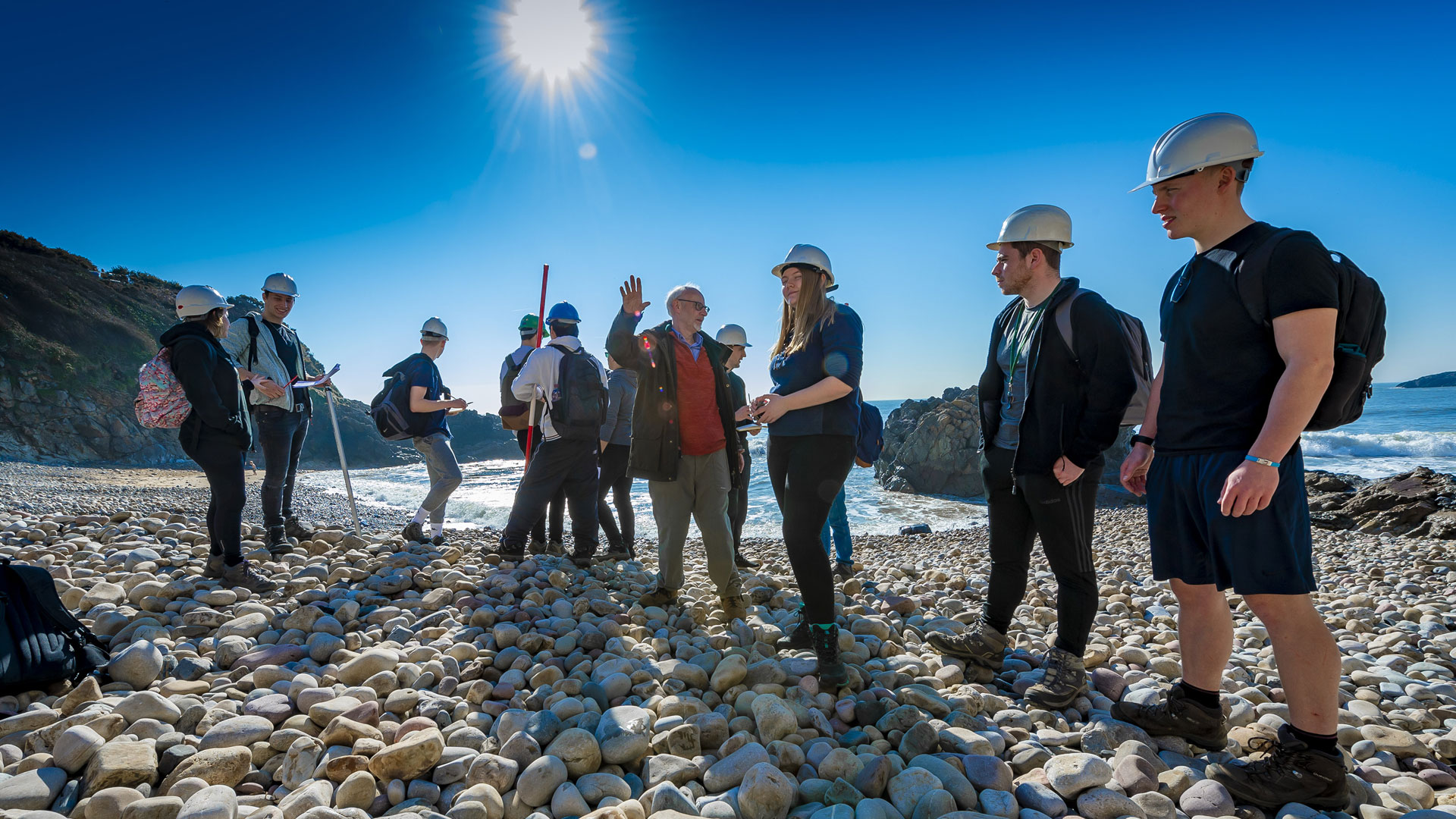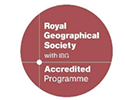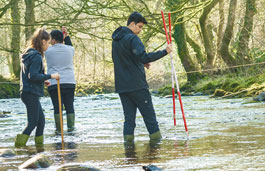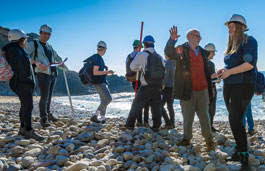Search
Geography BSc (Hons)
Study level: Undergraduate
This Geography BSc (Hons) course will cover the comprehensive understanding of the complex reciprocal relationships between human societies and the physical components of the Earth.
Year of entry
Location
Coventry University (Coventry)
Study mode
Full-time
Part-time
Sandwich
Duration
3 years full-time
4 years sandwich
6 years part-time
Course code
F800
Start date
September 2024
Course overview
The aim of this course is to provide you with the opportunity to develop applied knowledge and understanding of physical environments.
You will understand the evolution and significance of distinct places and the inter-relationships between people and the environment.
Rated Gold Overall
Teaching Excellence Framework (TEF) 20235 QS Stars for Teaching and Facilities
QS Stars University RatingsTop 5 Student City in England (Coventry)
QS Best Student Cities Index 2025Why you should study this course
- The Geography BSc (Hons) course has fieldwork embedded at every level, including at least one mandatory residential field trip2 to enhance their applied geographical skills.
- We aim for you to experience international mobility at least once during your studies through a mandatory international field trip. You will be required to contribute to the costs2 of the mandatory international field trip, the precise amount of which will vary year to year and be dependent on location and the availability of University subsidies. See fees and funding section for more details.
- There is a strong career/employability focus throughout the course, which is manifested in the four-year sandwich degree, where the third year offers the option of a year in industry or study abroad2, based on our long experience of organising placements with a wide range of professional contacts.
- You will acquire basic capabilities in Geographical Information Systems (GIS), a key skill sought by many employers. All students receive a certificate of GIS training on successful completion of an appropriate exercise.
- You will have access to laboratories to develop quantitative analytical skills. You will also utilise the Simulation Centre4, which enables geographical and environmental phenomena to be visualised in a safe setting that allows students to grasp issues and implications.
Accreditation and professional recognition
This degree is accredited1 and recognised by the following bodies:

Royal Geographical Society (with IBG)
This programme has been accredited by the Royal Geographical Society (with IBG). Accredited degree programmes contain a solid academic foundation in geographical knowledge and skills, and prepare graduates to address the needs of the world beyond higher education. The accreditation criteria require evidence that graduates from accredited programmes meet defined sets of learning outcomes, including subject knowledge, technical ability and transferable skills.
Watch the video below to get a taste of one of our field trip experiences.
What you'll study
This course has a common first year
The common first year enables you to work alongside students doing similar courses to you, to widen your knowledge and exposure to other subject areas and professions. You will have the opportunity to collaborate with other students, so you can share your insights and experience which will help you to develop and learn.
If you discover an interest in a specific subject you have studied, upon successful completion of your first year, you could swap degrees with another course in your common first year (subject to meeting progression requirements).
Common first-year courses
- Geography BA (Hons)
- Geography and Environmental Hazards BSc (Hons)
We regularly review our course content, to make it relevant and current for the benefit of our students. For these reasons, course modules may be updated.
How you'll learn
You will be taught by experienced, qualified teaching staff who bring professional and research expertise into their teaching (staff may be subject to change). Field trips, which occur in each year, provide an opportunity to contextualise classroom-based learning and develop practical skills through real-life application. In addition to the residential field trips, you will have the opportunity to undertake a range of day trips to gain practical experience of applying your knowledge2.
This course can be offered on a part-time basis. Whilst we would like to give you all the information about our part-time offering here, it is tailored for each course each year depending on the number of part-time applicants. Therefore, the part-time teaching arrangements vary. Request further information about part-time study.
Teaching contact hours
We understand that everyone learns differently, so each of our courses will consist of structured teaching sessions, which includes:
- On campus lectures, seminars and workshops
- Group work
- Self-directed learning
- Work placement opportunities2.
The number of contact hours may vary from semester to semester, however, on average, it is likely to be around 14-15 contact hours per week in the first and second year dropping to around 11 contact hours per week in the final year as you become a more independent learner.
In addition, you will be expected to undertake approximately 30-35 hours of self-directed study per week depending on the demands of individual modules. This self-directed learning allows you to use your research skills, consolidate your knowledge or undertake collaborative group work.
As an innovative and enterprising institution, the university may seek to utilise emerging technologies within the student experience. For all courses (whether on-campus, blended, or distance learning), the university may deliver certain contact hours and assessments via online technologies and methods.
Since COVID-19, we have delivered our courses in a variety of forms, in line with public authority guidance, decisions, or orders and we will continue to adapt our delivery as appropriate. Whether on campus or online, our key priority is staff and student safety.
Assessment
This course will be assessed using a variety of methods which will vary depending upon the module.
Assessment methods can include:
- Formal examinations
- Phase tests
- Essays
- Group work
- Presentations
- Reports
- Projects
- Coursework
- Exams
- Individual assignments
- Laboratories
The Coventry University Group assessment strategy ensures that our courses are fairly assessed and allows us to monitor student progression towards achieving the intended learning outcomes.
International experience opportunities
Geography is a global subject and international themes are core to our teaching. As such, much of our teaching relies on using case studies from overseas and your lecturers will draw on case studies related to their research from around the world. For example, previous cohorts have considered ecological monitoring and management in southern Africa and in the case of South America looked at the impacts of dams on natural river flows, biodiversity, infrastructure management and flood risk.
There are exciting international field trips2 in your second and final year. Our students will have the opportunity to travel abroad to gain field skills to better understand biogeography and ecology, and different natural hazards. Final year students will also be provided with the opportunity to travel abroad to investigate topics such as flooding, ecological succession, habitat management, evidence of land movement over time, and environmental reconstruction from sediments.
Entry requirements
Typical offer for 2024/25 entry.
Fees and funding
2024/25 tuition fees.
| Student | Full-time | Part-time |
|---|---|---|
| UK, Ireland*, Channel Islands or Isle of Man | £9,250 per year | Request fee information |
| EU | £9,250 per year with EU Support Bursary** £19,850 per year without EU Support Bursary** |
Not available |
| International | £19,850 per year | Not available |
If you choose to do a work placement2, you should consider travel and living costs to cover this. There is also a tuition fee3 of £1,250 that will cover your academic support throughout your placement year.
For advice and guidance on tuition fees and student loans visit our Undergraduate Finance page and see The University’s Tuition Fee and Refund Terms and Conditions.
We offer a range of International scholarships to students all over the world. For more information, visit our International Scholarships page.
Tuition fees cover the cost of your teaching, assessments, facilities and support services. There may be additional costs not covered by this fee such as accommodation and living costs, recommended reading books, stationery, printing and re-assessments should you need them. Find out what's included in your tuition costs.
The following are additional costs not included in the tuition fees:
- Optional international field trips: £400+ per trip.
- Any costs associated with securing, attending or completing a placement (whether in the UK or abroad).
Other additional costs
- Mandatory international field trips: Typically between £200 and £400 per trip
*Irish student fees
The rights of Irish residents to study in the UK are preserved under the Common Travel Area arrangement. If you are an Irish student and meet the residency criteria, you can study in England, pay the same level of tuition fees as English students and utilise the Tuition Fee Loan.
**EU Support Bursary
Following the UK's exit from the European Union, we are offering financial support to all eligible EU students who wish to study an undergraduate or a postgraduate degree with us full-time. This bursary will be used to offset the cost of your tuition fees to bring them in line with that of UK students. Students studying a degree with a foundation year with us are not eligible for the bursary.
Facilities
The faculty’s Engineering and Computing Building and Beatrice Shilling Building are designed to support hands-on learning. Our Sir John Laing Building also houses a variety of industry-standard labs and equipment4.
- Geotechnics Laboratory - Contains triaxial cells, direct shear box apparatus, a dimensional compression oedometer, California Bearing Ratio apparatus, soil classification equipment and Marshall test apparatus for asphalt mixes.
- Computer Laboratory - This computer laboratory is equipped with access to ArcGIS for mapping and geographical information systems. It is also equipped with Petrel/Eclipse software for oil and gas reservoir simulation and calculation.
- Informal Study Areas - Our open access spaces provide you with informal computer access to all the specialist software required for your studies. There are bookable spaces where you can meet with academics or work in small groups.
Careers and opportunities
Successful geography graduates possess several skills that are considered highly valued by employers, as skills include literate and numerate, experience in solving complex problems and developing solutions for multiple stakeholders through the collection and analysis of information.
On successful completion, you will have knowledge of:
- The nature, practical value and application of geography and the earth sciences and their concepts, methods and techniques.
- The constitution and character of space, place and landscape.
- Concepts of spatial and temporal scale, variation and change in the human and physical worlds.
- Reciprocal relationships between physical and human aspects of environments and landscapes.
- Patterns, processes and consequences of uneven development, difference and inequality.
- Nature, mitigation and management of contemporary environmental problems and hazards.
You will be able to:
- Plan, design and execute a piece of rigorous research or enquiry using appropriate methods and strategies of acquiring, interpreting and analysing information.
- Conduct field and laboratory work together with data collection and associated investigative and analytical skills.
- Recognise the moral and ethical issues involved in debates and inquiries.
- Show awareness of how skills and training can be applied to work of a geographical nature.
- Observe, contextualise and analyse information through field and laboratory studies.
Successful geography graduates possess several skills that are considered highly valued by employers, as skills include literate and numerate, experience in solving complex problems and developing solutions for multiple stakeholders through the collection and analysis of information.
Where our graduates work
Recent graduates are working for the Environment Agency, environmental departments of local authorities, environmental consultancies, such as Halcrow Group Ltd and Middlemarch Environmental, the Met Office, the Metropolitan Police, various research institutes and utility companies, such as Severn Trent Water. Others have gone on to pursue postgraduate study, teacher training and other professional qualifications.
Further study
You can choose to continue your studies at Coventry University with the Sustainability and Environmental Management MSc. You may be entitled to an alumni discount on your fees if you decide to extend your time with us by progressing from undergraduate to postgraduate study.
Graduate Immigration Route visa
Based on current information from the UK Government, international students whose study extends beyond summer 2021 may be eligible for a visa under the UK Government’s Graduate Immigration Route, which will enable students to stay and work, or look for work, in the UK at any skill level for up to two (2) years. Check the most up to date guidance available to check your eligibility and any updates from the UK Government before making an application or enrolment decision.
How to apply
You may also like

Geography BA (Hons)

Geography and Environmental Hazards (Hons)





